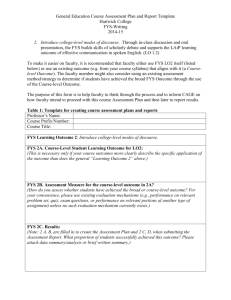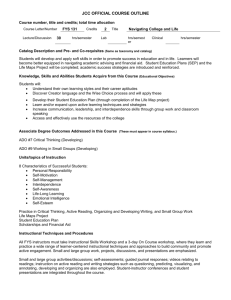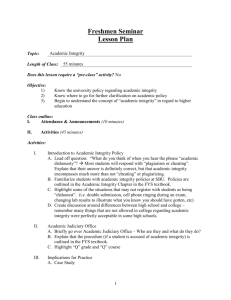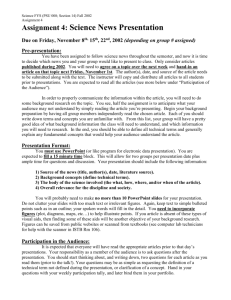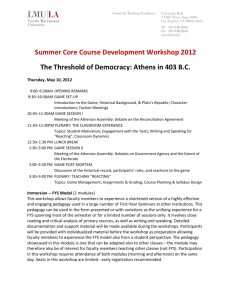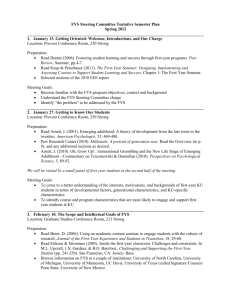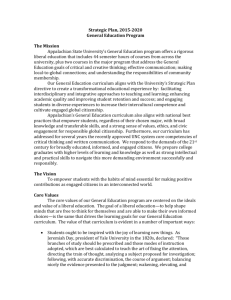2014-15 Board of Trustees Update Report
advertisement
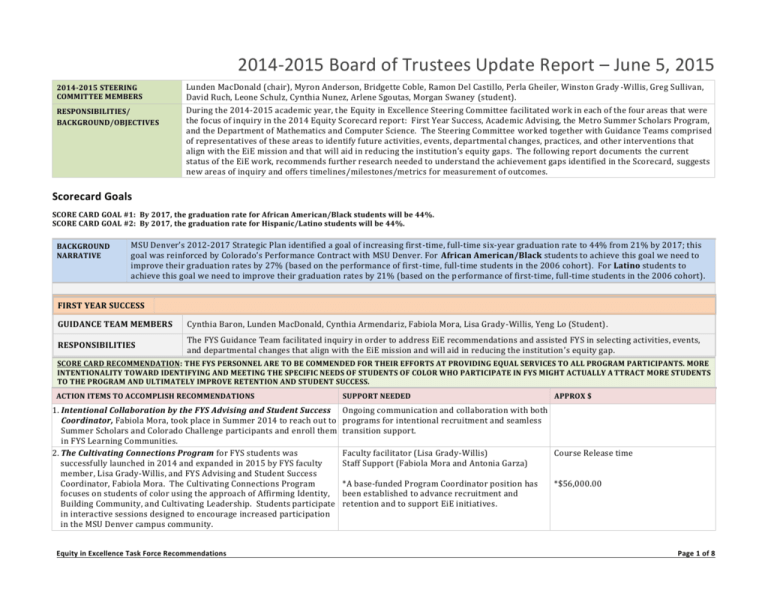
2014-2015 Board of Trustees Update Report – June 5, 2015 2014-2015 STEERING COMMITTEE MEMBERS RESPONSIBILITIES/ BACKGROUND/OBJECTIVES Lunden MacDonald (chair), Myron Anderson, Bridgette Coble, Ramon Del Castillo, Perla Gheiler, Winston Grady -Willis, Greg Sullivan, David Ruch, Leone Schulz, Cynthia Nunez, Arlene Sgoutas, Morgan Swaney (student). During the 2014-2015 academic year, the Equity in Excellence Steering Committee facilitated work in each of the four areas that were the focus of inquiry in the 2014 Equity Scorecard report: First Year Success, Academic Advising, the Metro Summer Scholars Program, and the Department of Mathematics and Computer Science. The Steering Committee worked together with Guidance Teams comprised of representatives of these areas to identify future activities, events, departmental changes, practices, and other interventions that align with the EiE mission and that will aid in reducing the institution’s equity gaps. The following report documents the current status of the EiE work, recommends further research needed to understand the achievement gaps identified in the Scorecard, suggests new areas of inquiry and offers timelines/milestones/metrics for measurement of outcomes. Scorecard Goals SCORE CARD GOAL #1: By 2017, the graduation rate for African American/Black students will be 44%. SCORE CARD GOAL #2: By 2017, the graduation rate for Hispanic/Latino students will be 44%. BACKGROUND NARRATIVE MSU Denver’s 2012-2017 Strategic Plan identified a goal of increasing first-time, full-time six-year graduation rate to 44% from 21% by 2017; this goal was reinforced by Colorado’s Performance Contract with MSU Denver. For African American/Black students to achieve this goal we need to improve their graduation rates by 27% (based on the performance of first-time, full-time students in the 2006 cohort). For Latino students to achieve this goal we need to improve their graduation rates by 21% (based on the p erformance of first-time, full-time students in the 2006 cohort). FIRST YEAR SUCCESS GUIDANCE TEAM MEMBERS Cynthia Baron, Lunden MacDonald, Cynthia Armendariz, Fabiola Mora, Lisa Grady-Willis, Yeng Lo (Student). RESPONSIBILITIES The FYS Guidance Team facilitated inquiry in order to address EiE recommendations and assisted FYS in selecting activities, events, and departmental changes that align with the EiE mission and will aid in reducing the institution’s equity gap. SCORE CARD RECOMMENDATION: THE FYS PERSONNEL ARE TO BE COMMENDED FOR THEIR EFFORTS AT PROVIDING EQUAL SERVICES TO ALL PROGRAM PARTICIPANTS. MORE INTENTIONALITY TOWARD IDENTIFYING AND MEETING THE SPECIFIC NEEDS OF STUDENTS OF COLOR WHO PARTICIPATE IN FYS MIGHT ACTUALLY A TTRACT MORE STUDENTS TO THE PROGRAM AND ULTIMATELY IMPROVE RETENTION AND STUDENT SUCCESS. ACTION ITEMS TO ACCOMPLISH RECOMMENDATIONS 1. Intentional Collaboration by the FYS Advising and Student Success Coordinator, Fabiola Mora, took place in Summer 2014 to reach out to Summer Scholars and Colorado Challenge participants and enroll them in FYS Learning Communities. 2. The Cultivating Connections Program for FYS students was successfully launched in 2014 and expanded in 2015 by FYS faculty member, Lisa Grady-Willis, and FYS Advising and Student Success Coordinator, Fabiola Mora. The Cultivating Connections Program focuses on students of color using the approach of Affirming Identity, Building Community, and Cultivating Leadership. Students participate in interactive sessions designed to encourage increased participation in the MSU Denver campus community. Equity in Excellence Task Force Recommendations SUPPORT NEEDED APPROX $ Ongoing communication and collaboration with both programs for intentional recruitment and seamless transition support. Faculty facilitator (Lisa Grady-Willis) Staff Support (Fabiola Mora and Antonia Garza) Course Release time *A base-funded Program Coordinator position has been established to advance recruitment and retention and to support EiE initiatives. *$56,000.00 Page 1 of 8 3. Additional culturally-specific programs sponsored by FYS include the Annual Latino Welcome Program and the Chinese New Year Celebration. In collaboration with the Office of Career Services and various Latina/o student organizations, FYS hopes to sponsor an ¡Adelante! leadership program targeted at Latina/o students in 2015. 4. Undocumented Student Support Initiatives are also taking place in the form of a new student organization (RISE), Dreamer Day participation, and training for faculty and staff. A Lumina grant proposal to increase support for this population was successfully written, and collaboration with other key retention and enrollment departments on identifying retention strategies for undocumented students will also contribute to future movement in this area. 5. Co-hosting of a Bilingual Family Campus Visit Day on November 14 th 2015 with Adams School District 50 focusing on Elementary- to High School-age students and their parents on considering MSU Denver as an accessible prospect for going to college. 6. Pilot Partnership Initiative with the MSU Denver Admissions Office and Denver Public Schools on a Spring High School Outreach Program focusing on 6 DPS High Schools. 7. Participation in the Faculty/Staff Cultural Competency Learning Community helped train staff to work with diverse student populations and identify areas of growth for FYS. Student Ambassadors engaged in and will continue to participate in cultural competence training including, identity development, micro aggressions, leadership, etc. POSSIBLE OUTCOME Ongoing collaboration with identified programs and units throughout the institution. Ongoing communication, collaboration, and training for staff and faculty around supporting undocumented students. Further grant-writing will also continue to support these efforts. $500 Ongoing Collaboration with community partners Ongoing collaboration and development of high school outreach materials. Support from Marketing and Communications. Coordinated training for FYS team and student staff. $1000.00 Training materials. By expanding these culturally-responsive initiatives and campus and community partnerships, such efforts will result in improved recruitment and retention numbers for students of color. SCORD CARD RECOMMENDATION: PROVIDE MORE TRAINING, INSTRUCTION AND INFORMATION ON FYS PROGRAMMING, BACKGROUND, AND PARAMETERS TO FULL-TIME AND AFFILIATE FACULTY WHO TEACH IN THE PROGRAM. ACTION ITEMS TO ACCOMPLISH RECOMMENDATIONS 1. Improved FYS Faculty communications have been implemented via a FYS Faculty Resource Guide distributed every semester; it highlights curricular and co-curricular programs for faculty to integrate into their courses. Faculty incentives and opportunities are also advertised in the Resource Guide and through a FYS Faculty Newsletter that goes out to all MSU Denver faculty. 2. FYS Faculty Welcome at beginning and FYS Faculty Celebration at end of each academic year provide fora to highlight opportunities/benefits for faculty. The Welcome serves as orientation for both first-time and returning faculty. A For Faculty By Faculty Workshop series sponsored by FYS has also supported faculty development. Periodic faculty strategy sessions provide additional opportunities for FYS faculty to dialogue about their experiences in FYS. 3. Communication in 2015 via the FYS Faculty Newsletter about participation of and retention success with students of color in FYS. 4. Spring sponsorship of Cultural Competency in the Classroom Faculty Development Program with Eduardo Bonilla-Silva, open to all MSU Denver faculty – Friday, April 17 th , 2015. Equity in Excellence Task Force Recommendations SUPPORT NEEDED APPROX $ Support from academic departments in sharing FYS faculty development opportunities and incentives with faculty. Ongoing collaboration/support from academic departments/colleges/schools to encourage faculty to take advantage of the orientation session designed for those teaching in the FYS Program. Spring 2015 Census Report from the Office of Institutional Research. Campus co-sponsorship, collaboration, and $3000.00 support in increasing faculty participation. Page 2 of 8 5. Spring Faculty Roundtable in conjunction with Bonilla-Silva’s Faculty Development Program. POSSIBLE OUTCOME Lunch. $500 Increased faculty awareness of the increasingly diverse student population at MSU Denver and the initiation of cultural competency training for MSU Denver faculty. SCORE CARD RECOMMENDATION: THE WEBSITE SHOULD BE UPGRADED WITH ASSISTANCE OF AN EXPERT WHO UNDERSTANDS BOTH WEB DESIGN AND STUDENT SERVICES TO CREATE A MORE USER-FRIENDLY DESIGN FOR FIRST-TIME-TO-COLLEGE STUDENTS AND/OR STUDENTS OF COLOR. ACTION ITEMS TO ACCOMPLISH RECOMMENDATIONS 1. 2. 3. FYS Website has undergone branding revisions with Marketing and Communications around the theme of “Transformation.” The FYS website will continue to be evaluated and improved upon in collaboration with Marketing and Communications. The development of a parent resources section on the FYS website that will be translated into Spanish by an outsourced entity identified by Marketing and Communications. The development of a high school student resource page for potential students considering MSU Denver with specific marketing content to this population. Such content will be identified though collaboration with the DPS High School outreach pilot. SUPPORT NEEDED APPROX $ Ongoing support from Marketing and Communications. Outsourced translation of website content. Collaboration with DPS and Adams 50 to identify user-friendly language and pertinent information to share with high school students and families. 4. The use of more photos of students of color that reflect a diverse student population. Greater emphasis on highlighting achievements of students of color through Marketing and Communications products and social media. Changes to the online image of FYS will be more appealing to prospective and current students who encounter images POSSIBLE OUTCOME and language that more accurately reflect their transition to and cultural presence at the university; they may also be more appealing to parents and families considering MSU Denver as a school of choice. SCORE CARD RECOMMENDATION: A YEAR LONG MODEL SHOULD BE CONSIDERED INSTEAD OF THE ONE SEMESTER SET UP. ACTION ITEMS TO ACCOMPLISH RECOMMENDATIONS SUPPORT NEEDED 1. In 2015-16 FYS intends to offer 20 full-year learning community options. 2. FYS course schedule has been more intentionally identifying major pathway courses for first-year students. This option also allows for a potential learning community cohort and pathways for majors. Collaboration with academic departments to expand full year model. Collaboration with academic departments and FYS Advisory Board to identify major pathway courses. POSSIBLE OUTCOME APPROX $ Greater retention and more timely progress toward graduation. ACADEMIC ADVISING GUIDANCE TEAM MEMBERS Ned Muhovich, Myron Anderson, Scott Bergman, Michelle Dupuis, Yee Tai (student) RESPONSIBILITIES The Academic Advising Guidance Team facilitated inquiry in order to address EiE recommendations and assisted Academic Advising in selecting activities, events, and departmental changes that align with the EiE mission and will aid in reducing the institution’s equity gap. Equity in Excellence Task Force Recommendations Page 3 of 8 SCORE CARD RECOMMENDATION: TO PROVIDE MORE CULTURALLY CONSCIOUS ADVISING, ALL ADVISORS IN THE ACADEMIC ADVISING CENTER SHOULD COMPLETE CULTURAL COMPETENCY TRAINING AND BE ENCOURAGED TO FOCUS ON MORE INTENTIONALITY WHEN WORKING WITH STUDENTS FROM CULTURALLY DIVERSE GROU PS. ACTION ITEMS TO ACCOMPLISH RECOMMENDATIONS SUPPORT NEEDED APPROX $ 1. Formed Advisors Council to develop training materials Provost (to charge group—received) $200 2. Develop plan to incorporate cultural competence into comprehensive training for all advisors . Buy-in from deans $500 3. Tie advisor training outcomes to the institution’s goal outcomes. 4. Hire advising trainer and include cultural competence prominently in the position description 5. Hire 16 advisors/retention specialists in Colleges and School to enhance student experience and retention; hire additional financial aid and admissions staff. 6. Implement other recommendations from the NACADA audit with respect to training, etc. POSSIBLE OUTCOME $1,800,323 Comprehensive training program for all professional advisors that includes cultural competence as a cornerstone will enhance Academic Advising’s ability to support students of color and contribute to increased retention and graduation rates. DEFERRED ITEMS NACADA audit also recommends comprehensive advising training for faculty advisors. SCORE CARD RECOMMENDATION: THE WEBSITE SHOULD BE UPGRADED WITH ASSISTANCE OF AN EXPERT WHO UNDERSTANDS BOTH WEB DESIGN AND STUDENT NEEDS TO CREATE A MORE USER-FRIENDLY DESIGN FOR FIRST TIME-TO-COLLEGE STUDENTS AND/OR STUDENTS OF COLOR. ACTION ITEMS TO ACCOMPLISH RECOMMENDATIONS 1. Redesign landing page with structure similar to Admissions, to more quickly direct students to resources. SUPPORT NEEDED APPROX $ Marketing & Communications. 2. Provide translated materials. POSSIBLE OUTCOME Redesign site to be congruent with current Marketing and Communications efforts. DEFERRED ITEMS Appointment scheduling or specific advisor contact information for students, regardless or discipline, credit hours, and proximity to graduation – possible in a future phase of Student Success Collaborative. NACADA audit recommendation is to move some items envisioned for this site to student Success Hub (ConnectU portal upgrade in progress). DEPARTMENT OF MATHEMATICS AND COMPUTER SCIENCE GUIDANCE TEAM MEMBERS Dave Ruch, Ramon Del Castillo, Bridgette Coble, Lindsay Packer. RESPONSIBILITIES The Math Guidance Team facilitated inquiry in order to address EiE recommendations and assisted Math in selecting activities, events, and departmental changes that align with the EiE mission and will aid in reducing the institution’s equity gap. SCORE CARD RECOMMENDATIONS: REDUCE MATH ANXIETY & INCREASE CONFIDENCE 1. Continue efforts to uncover racial inequity issues in math courses at MSU Denver and develop strategies to resolve these inequities. 2. Develop a “Train the Trainers” model in cultural competence for student tutors . 3. Provide information to faculty on how to create equity-minded syllabi. Equity in Excellence Task Force Recommendations Page 4 of 8 4. Engage in partnerships that help improve math skills of Denver youth. ACTION ITEMS TO ACCOMPLISH RECOMMENDATIONS The Math department is developing a stretch course for College Algebra. This course will run for two semesters and will keep students at MSU Denver who would typically be directed to CCD. Students of color are overrepresented in this group and the CCD courses are not preparing them to succeed in College Algebra. Outcomes will look at the number of students who passed College Algebra before the stretch course was developed and the number who pass after enrolling in the stretch course. This data will be disaggregated by race. The intent is to determine racial inequity in successful completion of College Algebra and to launch a specific response to resolve the issues. The faculty development presentation by James Gray (see below) has launched ideas for training our student tutors and Student Success Tutoring Center staff. Guidance team members will also research and create a list of resources that can be utilized to integrate cultural competence into training tutors in the Math department and Student Academic Success Center. The presentation by James Gray also launched ideas for enhancing syllabi. POSSIBLE OUTCOME SUPPORT NEEDED APPROX $ Reassigned time for course development, modifications for peer study rooms, special peer study instructor training and salary. Data analysis of student outcomes. Department summer revenue is covering the estimated $8,000 costs for 2014-16. See C below See C below No additional support needed at his time. No costs associated with this effort at this time. Implementation of stretch course for College Algebra and analysis of student outcomes disaggregated by race will inform future efforts to promote success and equity for students of color. The successful presentation by James Gray will contribute to the development of next step action items. DEFERRED ITEMS Engage in partnerships that help improve math skills of Denver youth; specifically, collaborate with local high schools to analyze curriculum and to promote a more successful high school -tocollege transition in math classes. SCORE CARD RECOMMENDATIONS: ENHANCING DEVELOPMENTAL/BASIC SKILLS COURSES 1. Develop equity-minded advising strategies that promote the value of basic skill development . 2. Cultural Competence training for counselors and advising staff centered on how to reduce stereotype threat. ACTION ITEMS TO ACCOMPLISH RECOMMENDATIONS SUPPORT NEEDED APPROX $ Investigate potential resources available that can support enhanced training for advisors. Include No additional support needed at his time. No costs associated with ideas from James Gray presentation. this effort at this time. The creation of a list of resources that can be utilized to integrate cultural competence into training for academic and POSSIBLE OUTCOME faculty advisors as well as tutors in the Math department and Student Academic Success Center. DEFERRED ITEMS Develop equity-minded advising strategies that promote the value of basic skill development SCORE CARD RECOMMENDATIONS: FACULTY DEVELOPMENT & COURSE RELEVANCY 1. Provide campus-wide cultural competence training. 2. Provide information to Math faculty on inclusive pedagogy and how to make math relevant to students ’ lived experience. 3. Develop and implement a plan to hire Category II Math Lecturers who are cultural ly competent. ACTION ITEMS TO ACCOMPLISH RECOMMENDATIONS Equity in Excellence Task Force Recommendations SUPPORT NEEDED APPROX $ Page 5 of 8 Contribute to planning of Celebration of Inclusive Excellence and promote relevant programs to Math faculty. Math faculty will participate in a presentation by James Gray who teaches math at the Community College of Aurora and has engaged in inclusive practices within his department. His presentation will allow our faculty to learn more about resources available and strategies for making pedagogy more inclusive. POSSIBLE OUTCOME N/A N/A Honorarium for James Gray and snacks for Estimated $600 to be participants requested from University Diversity funds. Math faculty will be more knowledgeable about cultural competence and inclusive pedagogy. DEFERRED ITEMS Develop and implement a plan to hire Category II Math Lecturers who are cultural ly competent. Math will be hiring Category II Math Lecturers for 2014-2015. We plan to incorporate an interview question on cultural competency for the hiring process. MSSP (BRIDGE PROGRAM) SUMMER SCHOLARS (TEMPORARILY SUSPENDED AND REPLACED BY SUMMER SPRING TO FALL 1ST YEAR TO 2ND YEAR RETENTION PROGRAM GUIDANCE TEAM MEMBERS RESPONSIBILITIES SPECIAL NOTES Lidia Alvarez, Perla Gheiler, Winston Grady-Willis, Donelyn Jones, Will Mellion, Tina Moses, Arlene Sgoutas The MSSP Guidance Team facilitated inquiry in order to address EiE recommendations and assisted MSSP in selecting activities, events, and departmental changes that align with the EiE mission and will aid in reducing the institution’s equity gap. The Guidance Team applauds the commitment on the part of MSU Denver’s senior leadership to provide scholarship funding for students to participate in the program. The next iteration of the program is planned to be the MSU Denver Bridge Scholarship Program and will be re-implemented in summer 2016. Bridge will work to support both the Colorado Commission on Higher Education’s Statewide Remediation Policy and the Denver Plan of the Denver Public Schools by structuring a set of collaborative relationships with community partners on and off campus. A key objective of the program is to implement a successful eight-week pre-collegiate summer scholarship program. To fulfill that objective, Bridge will involve concurrent enrollment for re mediation and college success. There is also discussion of creating an Adult Summer Bridge program to support Adult students beginning (or returning) to their higher education careers. A separate stand-alone initiative will be the STEM summer bridge program. For summer 2015, MSU Denver is introducing a pilot program, Summer Spring to Fall, which will serve students who have already experienced one or two years at MSU Denver, but who do not appear likely to return for another year. This pilot project is data-driven, utilizing information from the Noel-Levitz Predictive Analytics Model to determine which students are most likely to make the decision not to return to school. The pilot Summer Spring to Fall program will serve 35 students. Isaac Garcia noted that the “hope is to provide students with an intensive, holistic and proactive approach to student advising, advocacy, career exploration, and mentoring.” SCORE CARD RECOMMENDATION: ALIGN THE RETENTION GOAL (CURRENTLY 65% IN 2014) FOR THE MSSP PROGRAM WITH THE INSTITUTION’S OVERALL RETENTION GOAL FOR FIRST-YEAR STUDENTS TO 75%. THIS MAY MEAN ADJUSTING THE PROGRAM TO BETTER MEET STUDENT NEEDS. ACTION ITEMS TO ACCOMPLISH RECOMMENDATIONS SUPPORT NEEDED APPROX $ Bridge Program now in line with 75% retention rate for all programs of the Student Academic Success Center. The Noel-Levitz data can be used to identify Black and Latin@ students specifically to participate in the pilot program. POSSIBLE OUTCOME Improved retention for students from sophomore to junior year. Equity in Excellence Task Force Recommendations Page 6 of 8 SCORE CARD RECOMMENDATION: DEVELOP AND PLAN MSSP CURRICULUM EARLIER IN THE YEAR. ACTION ITEMS TO ACCOMPLISH RECOMMENDATIONS SUPPORT NEEDED APPROX $ Jessica Parker, English Department, will offer stretch composition course in the future. Communication, Arts and Sciences Department will offer specific courses in the future. Mathematics and Computer Sciences Department will offer relevant courses in the future. The Institute for Women’s Studies and Services will pilot its newly developed Student Success Skills course during summer 2015. SCORE CARD RECOMMENDATION: UPDATE THE WEBPAGE TO PROVIDE MORE DETAIL REGARDING PROGRAM REQUIREMENTS, ADMISSIONS AND PROGRAM SELECTION PROCESSES; TRANSLATE INTO SPANISH APPROPRIATE SECTIONS THAT WOULD BE BENEFICIAL FOR PARENTS. ACTION ITEMS TO ACCOMPLISH RECOMMENDATIONS SUPPORT NEEDED APPROX $ An effort will be made to update the web page in line with programmatic changes associated with Institution or program webmaster. rebranding as MSU Denver Bridge Scholarship Program. Accordingly, once web page update has begun, a concomitant effort will be made to translate Staff member fluent in Spanish appropriate sections into Spanish. SCORE CARD RECOMMENDATION: COMPLEMENT MSSP STRUCTURE AND COURSE OFFERINGS WITH OTHER PROGRAMMATIC CONTRIBUTIONS IN ORDER TO BETTER SUPPORT STUDENT SUCCESS, ESPECIALLY FOR STUDENTS OF COLOR. ACTION ITEMS TO ACCOMPLISH EACH RECOMMENDATION SUPPORT NEEDED APPROX $ Consideration should be given to establishing a freestanding lecture component drawn from the Department of Chicana/Chicano Studies and the Department of Africana Studies. Motivating students through cultural engagement POSSIBLE OUTCOME Confronting stereotype threat SCORE CARD GOAL #3: Every year between now and 2017, MSU Denver will collect six-year graduation data disaggregated by race/ethnicity to monitor progress towards achieving outcomes equity in graduation rates. FIRST YEAR SUCCESS ACTION ITEMS TO ACCOMPLISH EACH RECOMMENDATION SUPPORT NEEDED 1. Collection of data by race and ethnicity on program participation in co-curricular student programs 2. Collection of data by race and ethnicity to identify a correlation between program participation and academic performance. 3. Collection of qualitative data through a focus group on students of color who participated in the FYS program in Fall 2014 for program evaluation to determine student needs. Digital Student Participation Tracking System. Reporting from Coordinator for Data and Assessment. Faculty and Staff to facilitate focus groups and analyze data. POSSIBLE OUTCOME APPROX $ (In Kind) (Course Release x 2) 20/$25.00=$500 Amazon Gift Cards for student participants Such data collection will allow for better-informed and more intentional program planning and development. Equity in Excellence Task Force Recommendations Page 7 of 8 SCORE CARD RECOMMENDATION: THE ACADEMIC ADVISING CENTER SHOULD DISAGGREGATE ITS ADVISING DATA. ACADEMIC ADVISING ACTION ITEMS TO ACCOMPLISH EACH RECOMMENDATION SUPPORT NEEDED 1. Disaggregate outcome from SOAR. New Student Orientation 2. Disaggregate General Studies completion data. ITS (Cognos reporting) APPROX $ 3. Disaggregate Undeclared program data. 4. Disaggregate previous University-wide advising surveys. OIR Example outcome: additional outreach/resources for Undeclared students of color if analysis shows different patterns of major selection. POSSIBLE OUTCOME Lessons Learned: BACKGROUND NARRATIVE LESSON #1 OBJECTIVE As the EiE Steering Committee and Advisory Committee have worked to achieve the goals delineated in the Responsibilities/ Background/Objectives sections above, we have learned valuable lessons that should inform our continuing efforts to achieve equity in serving all of our students to improve our retention and graduation rates for everyone . Identifying academic content and student affairs areas that will have the requisite impact on student success in the timeframe identified is critical. Identifying target areas that will help us achieve the articulated goals. For example, Math was a great content area to target because we know it is one of those content areas where students postpone taking a foundational General Education Course, thus delaying their graduation and negatively affecting their retention. However, at least two (2) of the three (3) student affairs areas of focus we selected could only affect the six-year graduation rates (if all the recommendations are implemented by fall 2015) of a graduating class of 2021! Thus, we must identify student affairs and acade mic content areas that will improve the retention and graduation rates of students who are already here to achieve our goals of affecting retention and graduation by 2017. OUTCOME GOAL POSSIBLE FUTURE TARGET AREAS To impact students who are on campus now to positively affect their retention and graduation rates. 1. 2. 3. 4. 5. 6. Brother-to-Brother Veterans Groups ALANA Fostering Success Student Academic Success Financial Aid LESSON #2 To identify and implement useful recommendations is at least a two - if not a three-year process; one can only begin to analyze the impact of those changes then in the third or fourth year at the earliest. OBJECTIVE Continue to monitor progress and track student cohorts from 2006, 2007, 2008, and 2009 to assess impact. OUTCOME GOAL Improve retention and graduation rates for all students. Equity in Excellence Task Force Recommendations Page 8 of 8
